Beyond wealth: What happens AFTER you achieve financial independence?
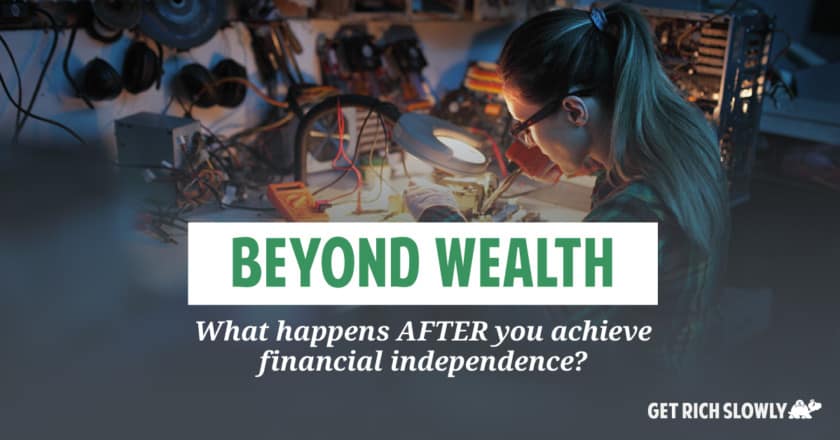
In their classic Your Money or Your Life, Joe Dominguez and Vicki Robin argue that the relationship between spending and happiness is non-linear.
More spending brings more fulfillment — up to a point. But spending too much can actually have a negative impact on your quality of life. The authors suggest that personal fulfillment — that is, contentment — can be graphed on a curve that looks like this:
![Increased spending brings increased happiness -- but only up to a point. [The Fulfillment Curve]](https://www.getrichslowly.org/wp-content/uploads/the-fulfillment-curve.jpg)
What is money for? An evening with Vicki Robin
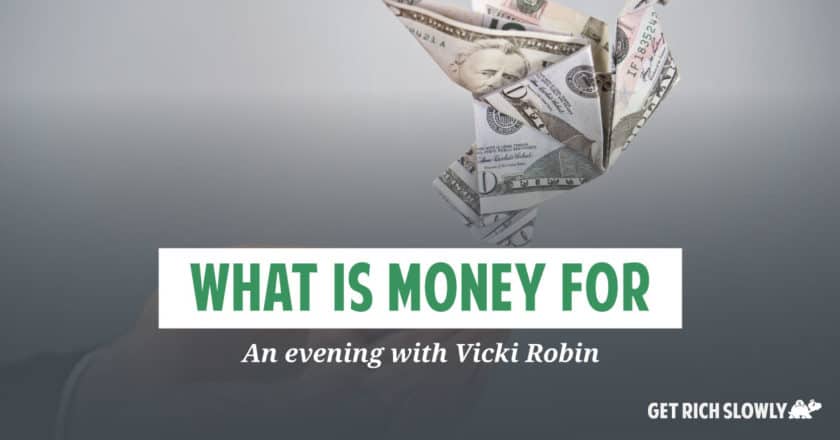
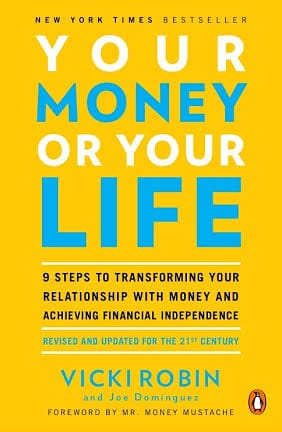
As an adult, my heroes are more mundane. They're the people who make personal finance accessible to average people. Long-time readers know that billionaire investor Warren Buffett is one of my heroes. So too is Dave Ramsey, who has helped countless people -- including me -- get out of debt.
But perhaps my biggest hero is an unassuming 73-year-old woman in cat-eye glasses who lives on Whidbey Island in Washington's Puget Sound.
Saving regret — and how to avoid it

In November 2018, the National Bureau of Economic Research published a paper called "Saving Regret" [here's the full PDF version]. Once you wade through the study's academic language, there's some interesting stuff here about why people do and don't save for retirement.
Saving regret, the authors say, is "the wish in hindsight to have saved more earlier in life".
Obviously, you can suffer from saving regret at any age. When I met 31-year-old Debbie for dinner last week, her issues boiled down to saving regret. She wishes she'd saved more when she was younger. But for the purposes of this paper, the authors turned their attention to folks aged 60 to 79, people of traditional retirement age.
Financial freedom and the value of time
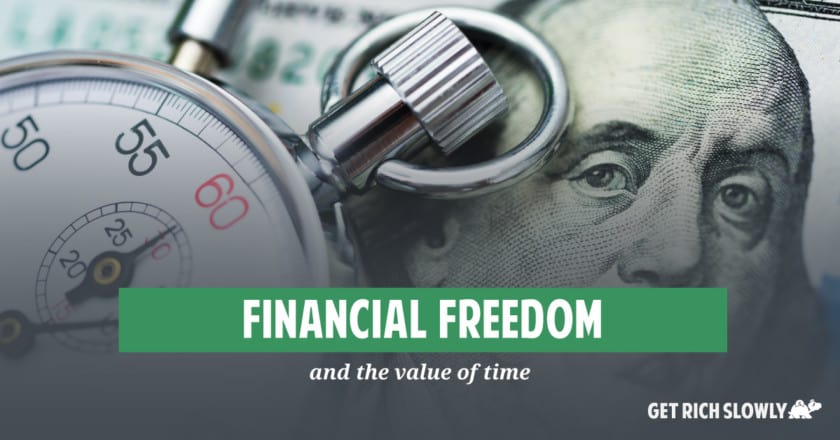
Note from J.D.
Last October, I had a chance to read an advance copy of Grant Sabatier's new book, Financial Freedom, which was just released this morning. I liked it. I loved parts of it. In fact, the second chapter of Financial Freedom inspired my article about how time is more valuable than money.Today, I'm pleased to present a (heavily edited) excerpt from that second chapter. Here's Sabatier on why time is more valuable than money -- and why you can and should retire early. (Links and photos are from me. Everything else is from the book. Note, however, I've heavily edited this chapter in order to abridge it and to make it more readable in blog format.)
If some ninety-year-old rich dude offered you $100 million to trade places with him, would you do it? Of course not. Why? Because time is more valuable than money.
Am I financially independent? (And does it matter?)
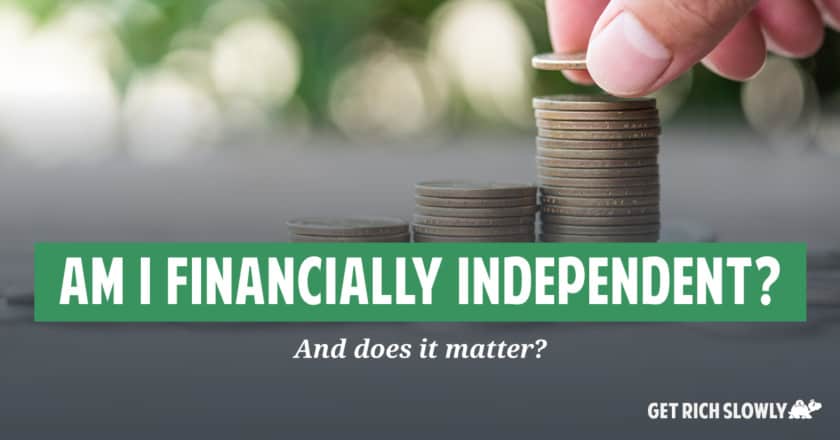
It's been two years since I last looked at my overall financial situation to determine whether I have the resources to meet my goals. In those two years, much has changed.
I sold my condo and bought a home in the country. I repurchased Get Rich Slowly. I invested in not one but three other businesses. The stock market has bounced around, I've begun part-time work at the family business, and I've made many other minor adjustments to my daily life.
With all of these fluctuations, I'm naturally left to wonder: Am I still financially independent?
Five lessons I learned while making a documentary film about FIRE
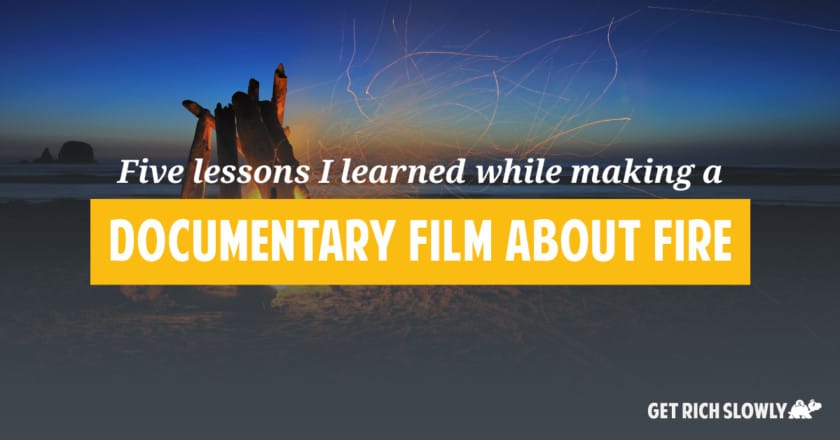
When J.D. decided to spend three weeks in Europe with his family, he asked a few people if they'd be interested in contributing articles during his absence. He even asked me!
My name is Scott Rieckens, and I'm new to the world of smart money management. I'm new to the world of financial independence and early retirement. I'm new, but I've totally immersed myself in it. I've immersed myself so much, in fact, that I've spent the past eighteen months creating a feature film about FIRE. (FIRE is the clumsy abbreviation for "financial independence/retire early". Basically, the FIRE movement is all about saving big so that you can choose to live however you want.)
"You've been in a unique position over the past year," J.D. said when I asked him what I should write about. "You've had amazing access to a variety of people who think and write and teach about financial independence and early retirement. You've been able to hear what they think and say in private as well as public. What about sharing your biggest takeaways from this experience?"
Which matters more for building wealth: Your saving rate or your investment returns?

My name is Zach, and I write at Four Pillar Freedom, where I tend to tackle financial topics through data visualization. While J.D. is on vacation, I offered to explore one of his favorite topics: the effects of saving rate versus investment returns.
Albert Einstein supposedly once said that compound interest is the eighth wonder of the world.But does data actually support this claim?
In this post, I explore the nature of compound interest, how long it takes to become an important factor in wealth accumulation, and whether or not it actually matters much for people who hope to achieve financial independence in a relatively short time.
Geographic arbitrage: How we used geo arbitrage to pursue our dreams
Howdy. My name is Michael Robinson. While J.D. is visiting Europe with his cousins, I volunteered to share how my wife and I have leveraged the power of geographic arbitrage to pursue our dreams -- and to build our wealth.
Geographic arbitrage means taking advantage of the differences in prices between various locations. You earn money in a stronger economy (San Francisco, maybe, or the U.S. in general) and spend it in a weaker economy (South Dakota or Ecuador, for instance).
Geographic arbitrage is a powerful tactic worth considering if you want to increase your saving rate so that you can better pursue your financial goals. Several times over the course of our lives together so far, my wife and I have managed to unwittingly stumble upon the benefits of geographic arbitrage.
How to retire early: Early retirement by the numbers
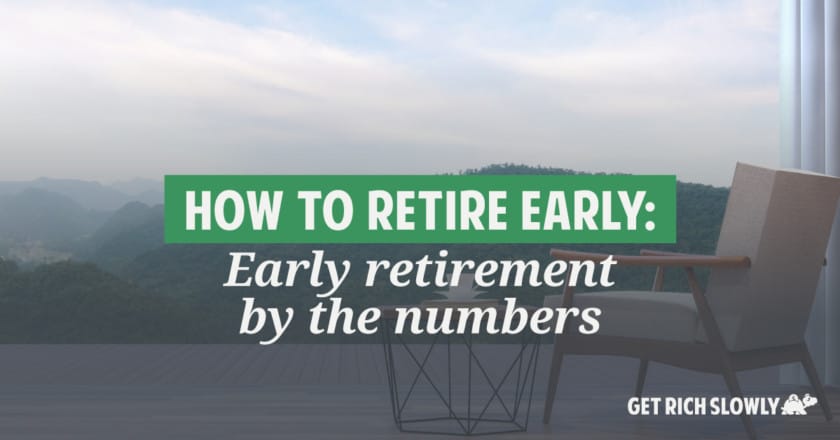
More and more, I'm meeting people who want to know how to retire early. There's been a lot of buzz in the media lately about early retirement, and that's led folks to wonder how much money they would need to quit their jobs -- or if early retirement is even something they should consider.
Why retire early? Well, for most people a job is a necessary evil. We work because we have to. Early retirement gives us the flexibility to choose how we spend our time, whether that entails sitting on the beach drinking margaritas or it leads to new work that provides meaning and fulfillment.
Lots of us dream of leaving the workplace in our forties or fifties instead of sticking it out until age 65 -- but we keep working to support the lifestyles to which we've become accustomed. We like our iPhones and Playstations and Priuses, so we surrender to the idea that we'll have fifty-year careers.
Time is more valuable than money
It's a GRS tradition! Each year on Halloween, I publish a story about planning for death. Usually these are general articles about estate planning. This year's story is personal.
When my best friend died in 2009, one of my biggest regrets was that I hadn't made time to travel with him.
Sparky had previously asked me to join him on trips to Burning Man (in 1996) and southeast Asia (in 1998) and Mexico (in 2003). I'd declined each invitation, in part because I was deep in debt but also because I thought there'd be plenty of time to do that sort of thing in the future.